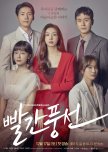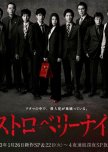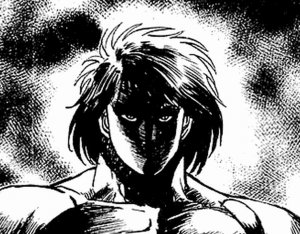
A Comedic Show About the Price of Revenge and the Pain of Enduring Failure
Red Balloon is a series which quite elaborately showcases the mixed emotions of troubled marriages and failed relationships. There are comedic highs and dramatic lows which Red Balloon fluidly alternates between in an effective manner.Seo Ji Hye's character, Jo Eun Gang, is perhaps a tad humourless in this; however, I quite enjoyed her performance as someone who mostly watched this to see her acting chops. I think people who are perhaps sensitive to infidelity in marriages will have a very hard time watching this show, but there is an intense, objective truth to how hard Eun Gang fights for her future despite her background and personal strife. One could easily see the character she plays as 'two-faced' or some sort-of 'stony' sociopath, but I think througout the series Seo Ji Hye is consistently able to convey how desperate and sometimes confused Eun Gang really is in her private life.
Maybe one knock on the series is that almost every character really come off as heels who don't really stand up for themselves until it is too late. That seems to be the recurring theme of all the storylines.
That said, the moments of righteousness and catharsis in the series are very satisfying.
One other major problem was that the background of Jung Yoo Min's character (Jo Eun San, the little sister of Jo Eun Gang) was a little undercooked. I suppose her character is written as a loner, but I thought she should've had more interactions outside her household: failing to show that character's social life outside of Ji Nam Cheol is a major flaw in Red Balloon. I'm guessing the demographic for this series is supposed to be for older women judging by the writer's past series. The writer's age is how I personally justify there being less attention paid to the youngest character outside of her romantic life! Take that with large grains of salt and no insult is intended! I quite liked the show regardless of this problem.
I think the main attraction with Red Balloon is actually its comedic elements. There is often a switch from the dramatic revenge storyline to slapstick dinner conversations or clown-like behaviour from the older characters. That levity is an important fact to point out about this series. Yes, Red Balloon's main story is mostly dramatic and yes, it explores infidelity in a mostly heartbreaking and anxiety-driven way. The show's various subplots involving the extended family, however, are very amusing. They also drive the main plot(s) which involve infidelity to interesting places. There's a real mixing of comedy and drama in Red Balloon that I find fairly accurate to our daily lives. Even at our worst moments, in a break-up or the death of a loved one, there's often a sense of serendipity that makes hardship almost surreal. I don't want to spoil too much in regards to this series, but there are a lot of suprising character interactions near the end of the series (especially involving Cha Won's father's patriarchal concerns and Eun Kan's uncle's personal problems) that really pushed me to re-appreciate the series as I was watching it.
Overall, I think the middling reaction to this show is justified: Red Balloon is not going to edge-out your favorite Korean dramas from their top spots any time soon. I do think, however if you are a fan of the leads involved like I was you'll find a tremendous amount to appreciate.
Was this review helpful to you?

How to Get Over Your Past Relationships? Easy: Make a Better One.
Dinner Mate is a slow-burn romantic TV show that doesn't use a lot of melodrama to build the chemistry between the two leads. It is a purely serendipitous tale of two professionals who find each other at the best time. From the early episodes it is abundantly clear that both Kim Hae Kyung, played by Song Seung Heon, and Woo Do Hee, played by Seo Ji Hye are quite unenthusiastic about romantic relationships. After some comedic situations and a little bit of coincidence to get the ball rolling, the backbone of the show's plot becomes, what I would call, "anonymous intimacy". The two main leads meet for dinner as a means to vent about their personal lives without deep feelings, without the potential anxiety of being boyfriend-girlfriend and without verbal confrontations. They do this by agreeing to eat together when they're hungry and by carefully talking about their lives but never giving their names or professions to each other. If we take the show's premise at face value, this is obviously a way for the show to set-up a lot of complicated social situations, combined with 'secret relationship' antics.I think, however, we need to take a step back and recognise that Dinner Mate isn't a plot-heavy show. Dinner Mate is very much an emotional and psychological journey where the back-and-forth events at Do Hee's social media job and Hae Kyung's clinic aren't that important. What becomes important over the course of the show are the particularities of how the two leads overcome their relationship woes.
Both leads are coming off of bad break-ups: Do Hee has been ghosted, Hae Kyung viciously dumped. Without spoiling, neither has entirely given up at the start of the series, but they are slightly weary of relationships and the drama that seems to follow their romantic lives around. What is great about Dinner Mate's story is the suggestion that this weariness is exactly the mindset which creates a strong relationship. The rules the "dinner mates" create ensure an ongoing, neutral social outing where they can eat with each other without judgement; this results in them respecting each other's privacy. They resist the temptation to pry into each other's lives and are able to spend time with someone else without emotional pressures.
This respect for the privacy and the emotional boundaries of strangers is the most important takeaway from the scenario of this show.
It might sound like I'm not describing a romantic television show, but that is obviously not the case. It's readily apparent from all the various music cues and slow-motion shots of the actors looking into each other's direction (calmly and with slight smiles on their faces) that the two leads are inevitably going to 'catch feelings' for each other. The dinner rules are meant to fail, which makes the show pretty funny at times. It's almost a recurring meme at the end of every second hour of this show for Seo Ji Hye and Song Seung Heon to be looking at each other across a street (for what seems like an eternity) while soft modern R&B plays in the background. While I did eye-roll during one or two of these slow-mo stares and maybe found them a little tiresome once or twice, I didn't mind Dinner Mate's straight-forward romantic tale. I vastly prefer a romantic story where the plot is driven by warm, non-verbal communication combined with a positive outlook for the relationship. The alternative romantic story (the one most television shows rely on) is a plot driven by betrayal, violence or a type of doomed 'forced contact' between the two leads. For example: boy meets girl after a disaster-like event, or boy meets girl but their families are enemies, or boy meets girl but one of them is a ghost, etc.
You can build a romantic story using unfortunate events that eventually forces the two leads to bond together in order to overcome the negativity of their situation, but this approach is only one particular part of how romance develops. This brings me to the two 'villains', or ex-partners, of the lead characters: Jin Noh Eul and Jung Jae Hyuk. Obviously I want you to watch the show for yourself so I'm not going to spoil much, but through these two characters Dinner Mate explores the transition out of chasing romance and into building romance. It's easy to argue that the two villains, in their persistent chase for romance, eventually start chasing romantic trauma instead. They don't evolve their mindset into their new circumstances whatsoever. Needless to say, the fact that some of the main and supporting characters in this show are psychologists shouldn't be lost on you. It bears repeating: you should not be expecting a lot of interesting twists and turns in this story; nor are the plot twists and 'shock' events in this show at all surprising.
Dinner Mate very much wants show how we can BUILD FROM romantic trauma rather than LAZILY ACCEPT romantic trauma. Yeah, there's some cheesy melodramatic scenarios near the end of the show, but make no mistake: Dinner Mate has a powerful message about the importance of mediated intimacy in romantic relationships rather than an accepted familiarity. We shouldn't take our loved ones for granted.
Was this review helpful to you?

Strawberry Night: After the Invisible Rain - Special
0 people found this review helpful
A Perfect End to the Takeuchi-led Strawberry Night Adaptation
While I don't think I have a lot to say about this special in particular, I do think it's a much more fitting end to the show than what was given in the feature-length movie "Invisible Rain". The stories here are all up-to-par with the original series; it's just one hard-boiled / neo-noir banger after another. Some people might find the character arcs for the characters a little strange or disappointing, but I found them realistic and perfectly fitting.While I wouldn't recommend anyone watch this special without first seeing literally every other Strawberry Night episode / spcecial which precedes this, I do think the storytelling on display here is strong enough that a new viewer can easily digest these tales without the previous context.
Was this review helpful to you?

Strawberry Night's Movie-Sequel, "Invisible Rain" Requires The Preceding Series and 2010 Special.
While I love Strawberry Night as a whole, I think this film is the weakest portion of the story; it is a decent bookend to the narrative, but it's missing some of the key emotional cruxes of the series.I think this film should have been much more fleshed out in terms of character interactions; particularily, more scenes between Himekawa and Isao (the anti-hero guest character for the movie) would've heightened the quality of the story. As it is, the case presented in "Invisible Rain" is probably the weakest out of all the investigations the Strawberry Night characters have participated in. There's less of a focus on the motivation of the killers or upon Himekawa's personal feelings on the crimes she's investigating. The whole plot comes off as unintentionally dull. On the plus side, this film is as I said earlier: a bookend. It completes Himekawa's story arc that starts in that 2010 special.
Throughout the series, Himekawa is reprimanded by her fellow division commanders in various ways and by the end of this film you can see small spurts of real growth in her character. There are very subtle moments where Himekawa directly admits that she has been too headstrong and isolated in past investigations. This film needed way, way, way more subtle moments in that manner. The investigation process that Himekawa takes part in is the real attraction of this series. Specifically, the workman-like fashion in which this police procedural series is written emphasizes meetings, planning and interviews. It is, strangely, less concerned with aestheticising clues, evidence or perplexing mysteries. If you don't want to see people walking the streets asking questions, you're probably watching the wrong show! These small conversations are the strongest reason for watching the TV show, specials and this movie (even though the film is lacking in this conversational aspect compared to the previous entries). Yes, there are criminal cases being investigated by Himekawa's team, but the intricacies of maneuvering around her colleagues, her superiors and her own investigation team are always what drives the narrative to interesting places.
All that said, the key thing this film is missing is a climactic interrogation scene where Himekawa confronts the suspect in an emotional manner; I think the climactic scene we were given for this film is quite the cop-out in this respect. No pun intended, it just came to my mind!
Without spoiling too much, the main takeaway from this movie is that people who share deep, emotional trauma can sense and "see without seeing" that trauma in each other. That is why it is called "Invisible Rain"; I think the concept was adequately done, but this film's thematic content is nowhere near the superb closer to the television series "Soul Cage" or the pivotal flashback sequences in the 2010 special. If you don't want to watch the entire series (or if you've accurately sensed that I'm NOT RECOMMENDING you watch this movie as a blind watch), I'd highly recommend watching the 2010 special and then perhaps the last three episodes of the television series (Episodes 9, 10 and 11).
This movie may disappoint you; the television series will not.
Was this review helpful to you?

This review may contain spoilers
A Solid Acting Performance by Yuko Takeuchi
Is Strawberry Night worth watching?Yes and no.
I'm still not entirely familiar with the canon of Japanese television, but I suspect women don't often take leading roles in police procedurals. Strawberry Night plays into this quite a bit by featuring a male, hard-nosed detective in an antagonistic role to Yuko Takeuchi's leading role; in addition, the foundation of Himekawa Reiko's backstory and her character is heavily based on her personal life as a woman. I'm trying not to spoil things too heavily as learning about what makes Reiko tick is the best part of the special; her characterisation is much more interesting than the series' murder mystery storyline. All this acts as a double-edged sword for it makes Himekawa Reiko a little predictable (maybe even shallow) as a character, but also allows Takeuchi to show audiences her excellent acting chops.
Like most Japanese dramas, I really appreciated the blocking, set pieces and lighting. There really is a focus on cinematography and editing in Asian dramas that is head and shoulders above what you see in Western dramas (particularily the muck that is raked on Netflix nowadays). The dialogue and narrative of Strawberry Night aren't anything to write home about: it's one of those "if you've seen one serial murder mystery you've seen them all" type of situations. The main reason to watch this special (and the subsequent TV show) is to see how Takeuchi performs in a more serious setting where she isn't a romantic interest.
Basically, I wouldn't rate this highly as a work of detective fiction or within the police procedural genre, but if you wanted to see a Yuko Takeuchi performance outside of her films, this might be an interesting watch.
Was this review helpful to you?






